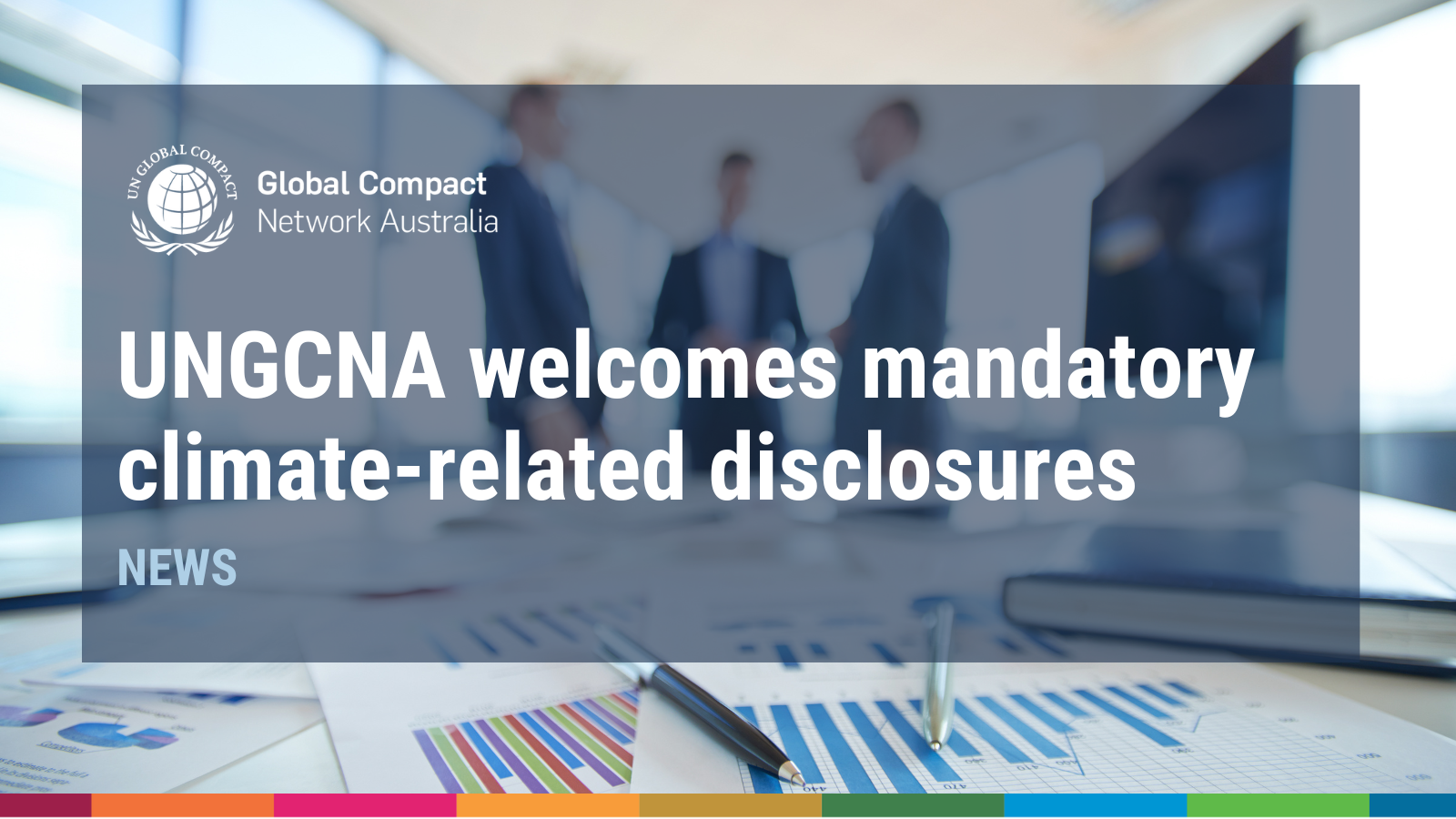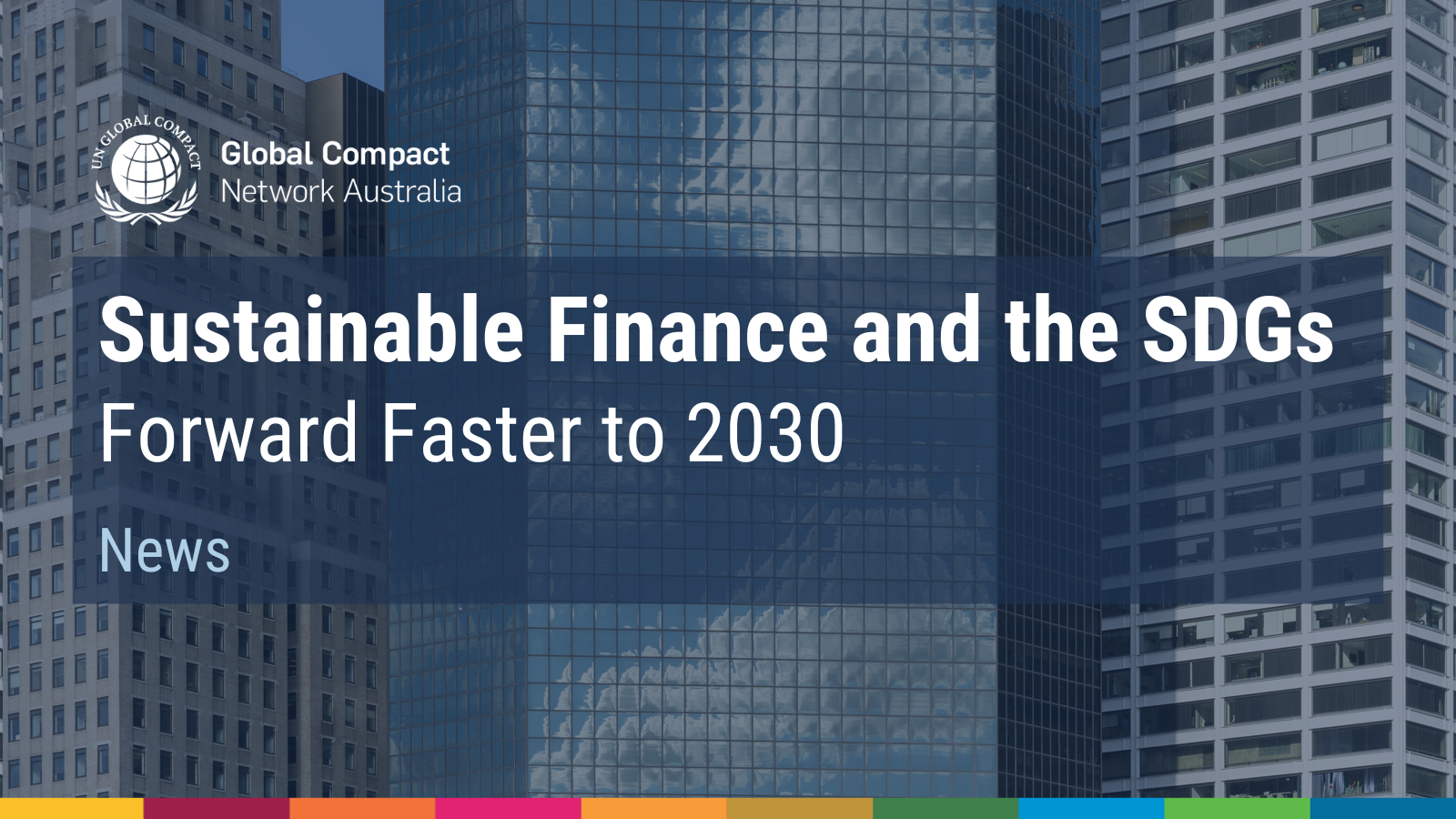
News
UNGCNA welcomes mandatory climate-related disclosures
Dr Evan Center | September 10, 2024
On Monday 9 September, the Australian House of Representatives passed the Treasury Laws Amendment bill, which includes mandatory climate-related disclosures. Mandatory climate reporting is set to begin in 2025.
Businesses are required to report on their material climate-related financial risks and opportunities, metrics and targets regarding scope 1, 2, and 3 greenhouse gas emissions, and a climate-related strategic plan on mitigating risks and exploring opportunities. Businesses must also conduct and disclose a scenario analysis, evaluating their impacts, risks, and opportunities under both a 1.5-degree Celsius global warming scenario and a more severe scenario exceeding 2.5 degrees Celsius. This mandate aligns with international sustainability reporting guidelines created by the International Financial Reporting Standards’ (IFRS) International Sustainability Standards Board (ISSB).
Who is reporting and when?
Group 1 includes large businesses with over $500M in revenue. Group 2 includes medium businesses with over $200M in revenue, and Group 3 includes smaller businesses with revenues of $50M and over. Reporting for the largest entities, Group 1, will commence from 1 January 2025, with Group 2 phased in from 1 July 2026 and Group 3 entities from 1 July 2027.
Scope 3 reporting is implemented through a phased approach with its disclosure deadline set one year later than other reporting requirements, whilst also providing legal protection against litigation related to these disclosures for up to three years.
“The passing of this bill is a crucial first step in creating transformational change in Australian business,” explained Kate Dundas, Executive Director of the UN Global Compact Network Australia.
How UNGCNA supports Australian businesses
As businesses prepare for these new reporting requirements, many are already beginning to collect data for the next financial year to ensure compliance and readiness. To support businesses in navigating these disclosure requirements, the UN Global Compact Network Australia (UNGCNA) and the University of Melbourne are leading an initiative to foster collaboration and build capacity among Australian businesses. The Australian Climate Reporting Community of Practice (ACRCoP) brings together ASX30 companies and other leading climate reporters. This group works collectively to address the challenges associated with climate reporting. Previous ACRCoP discussions have tackled key topics, such as integrating scenario analysis into corporate and financial planning processes; enhancing board engagement and capabilities in light of growing greenwashing liabilities; and facilitating supplier relationships and technologies for scope 3 reporting.
By leveraging these collaborative efforts, Australian businesses can understand the evolving landscape of climate-related disclosures and develop strategies that not only comply with new regulations but that harnes the opportunity to drive meaningful progress toward sustainability goals.
To help your business navigate new climate disclosure requirements and advance toward net zero, join us at the Uniting Businesses LIVE Australia conference and Annual Dinner. Engage with sustainability experts and industry leaders to explore strategies for effective climate reporting and seizing opportunities in Australia’s net-zero transition.
Understand climate reporting better at these upcoming conference sessions:
1. Advanced actions for Australian Sustainability Reporting Standards (ASRS) and mandatory climate reporting: Scope 3, supplier engagement and supporting technology. This session takes a nuanced dive into Scope 3 reporting and brings together sustainability reporters, suppliers and the supporting technology necessary to streamline data, and features panellists:
- Jack Holden, GM Sustainability – Global Markets, Fonterra
- Dr Barbara Nebel, CEO, thinkstep-anz
- David Sandrussi, Associate Director, Climate Change and Sustainability, KPMG
- Facilitator: Anna Stewart, Director, UN Global Compact Network Australia; Head of ESG and Governance, Coles.
2. Global movements in voluntary reporting for nature positive impact: trends, tips, timelines, and strategies for success. This session surveys the global landscape of voluntary reporting and highlights the most important influences on the future of nature-positive reporting in Australia, and features panellists:
- Anthony O’Grady, Senior Research Officer, CSIRO
- Rayne van den Berg, Principal, NatCap+
- Heidi Asten, Partner, Herbert Smith Freehills
- Facilitator: Karen McWilliams FCA, Director and Chair, Finance, Risk and Audit Committee, UN Global Compact Network Australia; Sustainability and Business Reform Leader, Chartered Accountants Australia and New Zealand (CA ANZ).
*Authors: Aditi Abhayakumar and Dr Evan B Center.
UNiting Business LIVE Australia is the defining sustainability event of the year, giving leaders the opportunity to shape the future of business in Australia.
In a watershed moment for corporate accountability, UNiting Business LIVE Australia conference and annual dinner will equip businesses to navigate ongoing socio-environmental and regulatory changes.
This event from the UN Global Compact Network Australia (UNGCNA), the Country Network of the world’s largest corporate sustainability initiative, presents insights from international sustainability leaders to solve the most pressing challenges faced by Australian organisations today.
Secure your delegate passes today: https://bit.ly/4cuq1AU


